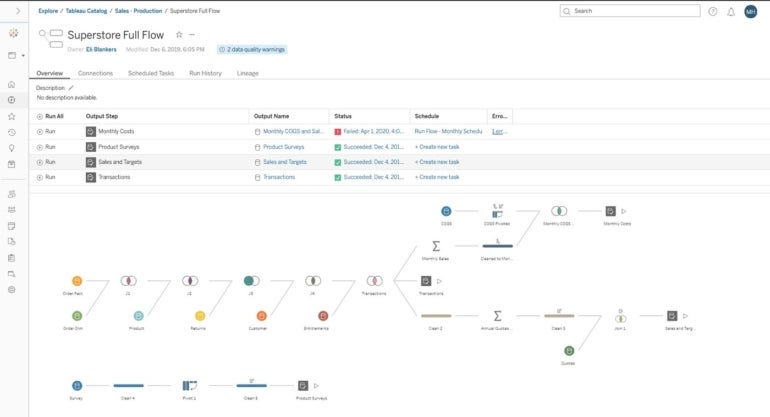Data governance serves as the backbone for businesses to effectively manage and utilize their data. It starts with the inventory and classification of available data based on automated and intelligent data governance tools. Once the data is organized, policies are created to govern its use and data stewards are appointed as subject matter experts.
Data governance becomes even more important in the realm of e-commerce. High-quality data is not just a requirement, it's a critical asset for making timely and accurate decisions. Additionally, as e-commerce platforms collect sensitive consumer data, governance becomes important to ensure compliance and security.
Jump to:
How data governance works in e-commerce
E-commerce businesses collect data from a variety of sources, including web analytics, email and marketing tools, online transactions, and surveys. This information is integrated and used by relevant stakeholders. Done right, data governance efforts ensure that these stakeholders have access to data and that it is of high quality (Diagram A).
Diagram A

Managing and integrating these data sources in ecommerce means your team can generate actionable insights about customers, trends, products, regions, and more. These insights play a huge role in:
- Information gap to adapt to consumer and market trends.
- More effective customer retention and engagement.
- Optimize pricing, inventory, and labor allocation.
- It provides information not only on innovations but also on new untapped market opportunities.
Reference: For a complete overview of how data governance works, check out our guide. How data governance works.
Why is data governance important for e-commerce companies?
E-commerce companies lacking a clear data governance strategy are exposed to challenges such as data breaches and regulatory fines, and can ultimately lose customer trust. Business growth and brand reputation can also take a hit. Therefore, the importance of data governance in e-commerce should not be underestimated.
Improved visibility, relevance, and consistency
Digital outlets and advanced customer journeys provide e-commerce companies with an influx of diverse data. This data, from customer purchases to inventory, must be updated seamlessly across multiple platforms. However, this responsibility often falls on different teams, risking the introduction of data silos and stale data.
An efficient and integrated data governance system can help e-commerce companies manage such distributed data efficiently (Diagram B). Such systems ensure that data remains relevant and consistent across platforms, preventing data silos. This gives these companies greater visibility to scale their operations.
Diagram B

Limit data exposure
Data must circulate seamlessly across the entire ecosystem of e-commerce and retail stakeholders. Although unrestricted data flow can prevent data silos and improve workflow efficiency, its circulation can raise safety and security concerns. But on the flip side, security breaches involving sensitive customer data often destroy relationships between customers and brands.
Reference: Check this out IT staff system and data access policies From TechRepublic Premium.
Data governance systems provide e-commerce brands with security features such as two-factor authentication, data encryption, and tokenization to limit access to sensitive data.
Dealing with data inconsistencies
Data inconsistencies can occur in the data repositories and warehouses that e-commerce companies store. Changes in one repository mean all other repositories must be updated to reflect the same changes, which can become complex and overwhelming over time.
Inconsistent data impacts sales, profits, productivity, and overall strategy. However, a robust data governance system leverages data pipelines to help manage, modify, and thoroughly validate raw data. As a result, e-commerce businesses can enjoy better data visualization and easier, faster, and more accurate data analysis.
What are the benefits of data governance in e-commerce?
While the importance of data governance focuses on its necessity and the challenges it solves, the benefits show that it has a positive impact and added value to e-commerce businesses. A data governance framework can benefit e-commerce businesses in areas such as:
- Overall performance: Data governance increases efficiency and enables teams to quickly find accurate data and generate insights.
- Data quality: Gain visibility into data usage for your team and stakeholders by consistently tracking data quality metrics.
- Better business insights: E-commerce companies can identify areas of weak performance, gain a competitive edge, and discover new revenue streams.
- Improved decision making: Well-managed, high-quality data facilitates fast and accurate decision-making while maintaining privacy and compliance.
- Data ownership, responsibility and accountability: Data governance establishes clear ownership and accountability, guiding e-commerce teams on who to talk to about data-related issues.
Adopting data governance in e-commerce
Data governance has proven to be a necessary element for e-commerce. Properly implementing a robust data governance solution can provide e-commerce companies with new opportunities, improved security and customer trust, increased sales and e-commerce growth.
By adopting data governance best practices, e-commerce companies can understand how to establish and maintain data governance and position themselves for growth.
reference: Data governance overview You can learn more.

